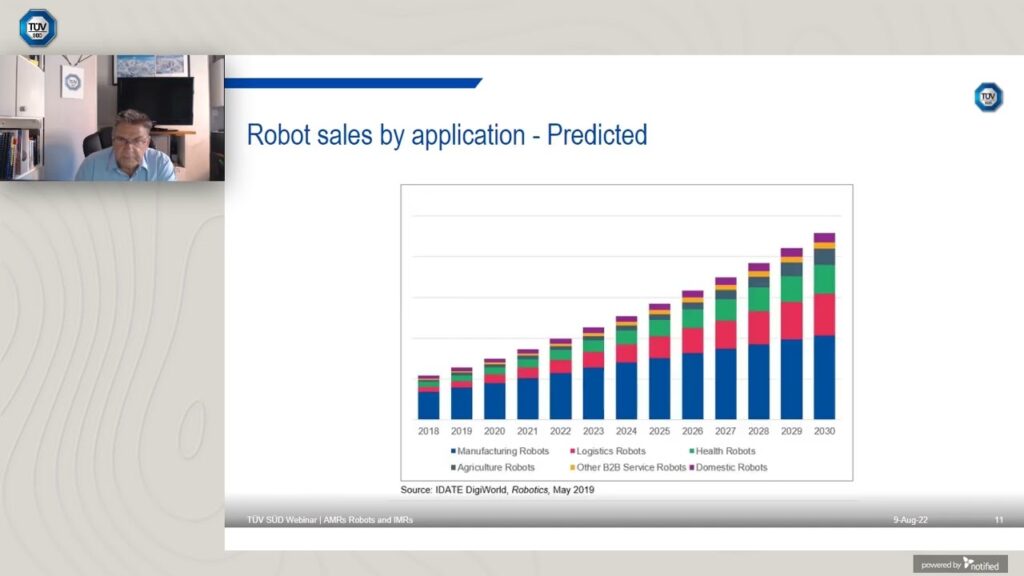Automation is revolutionizing the manufacturing industry, with industrial robots playing a crucial role in increasing efficiencies and streamlining operations across various sectors. This growth in automation has paved the way for remarkable advancements, leading to Industry 4.0, and prompting a paradigm shift in traditional manufacturing processes.
Through a recent webinar titled “AMRs Industrial Robots and IMRs – Industry 4.0,” the significant impact of industrial robots on manufacturing was highlighted. This article aims to provide an in-depth analysis of the role of industrial robots in manufacturing, explore their benefits, and shed light on their impact on the future of the industry.
Industrial robots are programmable machines designed to automate repetitive tasks, often with high precision, speed, and accuracy. They are capable of performing multiple functions, such as assembly, welding, painting, packing, and material handling. By incorporating robotics, manufacturing companies experience increased productivity, improved quality control, enhanced safety measures, and reduced costs.
In the webinar, it was emphasized that industrial robots have become an integral part of Industry 4.0 – the fourth industrial revolution characterized by the fusion of digital technologies with traditional manufacturing processes. These robots are at the forefront of this revolution, driving the transformation towards smart factories and intelligent automation.
One of the key advantages of deploying industrial robots in manufacturing is their ability to work autonomously, eliminating the need for constant human supervision. This independence boosts productivity as robots can operate continuously without the limitations of human fatigue or work shift constraints. They can also work in hazardous environments, ensuring the safety of human workers.
Furthermore, industrial robots offer unmatched precision and accuracy, significantly reducing the margin of error in manufacturing processes. This leads to higher product quality, fewer defects, and ultimately, increased customer satisfaction. When combined with artificial intelligence (AI) and machine learning algorithms, robots can adapt and optimize their processes, continuously learning from their surroundings and improving their performance over time.
Another critical aspect highlighted in the webinar was the integration of robotics with other emerging technologies like the Internet of Things (IoT) and big data analytics. By connecting industrial robots to the IoT, manufacturers can gather valuable real-time data, enabling them to monitor and control production remotely. This connectivity facilitates predictive maintenance, reducing downtime and enabling proactive interventions to prevent equipment failures.
One such example of industrial robots in manufacturing can be found in the automotive industry. Companies like Emanpack, jlpack, and Orion have embraced automation and deployed robots to carry out complex assembly tasks. These robots operate seamlessly alongside human workers, enhancing efficiency and optimizing the production line.
In an interview with the CEO of an automotive manufacturing company, he shared his perspective on the integration of industrial robots into their operations. He mentioned how the implementation of automation has significantly improved their production processes. Robots now handle repetitive tasks that were previously performed by human workers, allowing them to focus on more intricate and skill-driven jobs.
The CEO also highlighted the cost-effectiveness of industrial robots, stating that while the initial capital investment may be substantial, the long-term benefits outweigh the costs. With decreased labor requirements, reduced error rates, and increased overall productivity, the return on investment for deploying industrial robots in manufacturing is significant.
The impact of industrial robots in manufacturing goes beyond individual companies. The exponential growth in automation has triggered a surge in the robotics industry, leading to the creation of new job opportunities centered around robotics, programming, and maintenance. As the demand for skilled technicians and engineers proficient in robotics continues to rise, educational institutions have started offering specialized programs to cater to this need.
Looking towards the future, industrial robots are expected to play an even more prominent role in the manufacturing industry. With advancements in AI, machine learning, and sensor technologies, robots will become more intelligent, versatile, and capable of handling increasingly complex tasks. This will enable manufacturers to further optimize their operations, boost productivity, and maintain their competitive edge in the global market.
To summarize, industrial robots are revolutionizing the manufacturing industry, spearheading the transition towards smart factories and Industry 4.0. Their remarkable capabilities, including autonomy, precision, and connectivity, have led to increased productivity, improved quality control, and reduced costs. As the manufacturing sector continues to evolve, the integration of industrial robots is set to play a crucial role in shaping the future of the industry.
Industrial Robot
“Revolutionizing Manufacturing: Unleashing the Potential of Industrial Robots in Industry 4.0”


